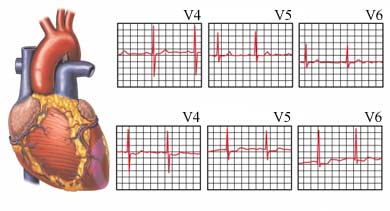Veloergometry – Cardiac Stress Test
Description veloergometry
Cardiac Stress Test – record heart activity in sports. Heart condition is controlled by means of electrodes to record the electrical activity. Also within Test controlled by changes in blood pressure and heart rate.
In some cases, executed veloergometry?
During exercise the body consumes more oxygen, which it receives from the blood. To deliver blood to the organs faster during exercise, the heart has to work actively. Cardiac stress test is used, to see, how well the heart works during physical nagruzkah.Test most often done:
- To assess the condition of the body, if complaints of chest pain associated with heart;
- To determine, whether there is a blockage or narrowing in the arteries of the heart (coronary artery disease);
- To detect heart rhythm abnormalities or recording of the heart during or after physical exertion;
- To control the reaction of the heart to the prescribed treatment or procedures;
- To determine a safe level of stress;
- To plan ways to recovery heart attack.

Possible complications during cardiac stress test
Cardiac stress test presents minimal risk. Complications may include:
- Chest Pain;
- Cardiac arrhythmias;
- The presence of a heart attack (rarely).
Medical personnel will stop the test, If there are complications begin. Also during the procedure, the doctor usually present (usually, cardiologist).
How is a heart stress test?
Before the procedure
Before cardiac stress test can be assigned to the following tests:
- Medical checkup;
- Electrocardiogram – test, which detects heart activity by measurement of electrical current through the heart muscle;
- Echocardiogram – test, which uses sound waves (ultrasound), to examine the size, shape and motion of the heart and its valves function;
- Revision of the list of drugs taken. Some medicines should not be taken before testing.
Preparation for the procedure:
- Do not eat and drink products, caffeine for 12-24 hours prior to testing;
- You can not eat or drink anything, except water, for four hours before testing;
- It is forbidden to smoke for several hours before testing;
- In the procedure, wear comfortable clothing and walking shoes or sneakers;
- It is necessary to provide the medical personnel list of drugs taken;
- In the presence of diabetes, before the procedure is necessary to check the level of glucose.
Procedure cardiac stress test
ECG electrodes are attached to the chest, and lifted performance in idle mode. It will also be measured blood pressure and pulse rate.
Cardiac stress test is performed on a treadmill (often) or stationary bike. The subject begins to walk slowly or pedaling. At regular intervals,, speed or load will be increased. ECG, blood pressure, heart rate, and symptoms will be closely monitored.
The test may be terminated prematurely, if you feel tired, there was a pain in the chest, breathing problems, or have symptoms, which indicate heart problems. If significant changes in the ECG will also need to stop testing. After completion of the exercise blood pressure, heart rate, ECG will be recorded, while these indicators do not return to normal.
The doctor may also prescribe blood test for photographing, called nuclear stress test. A small amount of a radioactive chemical into the procedure will be put into a vein. Scanning will be carried out in a special chamber. The images will help identify areas of the heart muscle, which do not receive enough oxygen. The second series of photos done in about an hour after the procedure, a heart stress test.
It can be carried out stress echocardiography. This ultrasound examination, to take pictures of the heart before and immediately after a heart stress test.
After a heart stress test
You can immediately return to normal activities.
How long will conduct cardiac stress test?
Partial test typically takes less than 15 minut.Polnaya procedure will last about an hour. A nuclear stress test may take up to 3-4 hours.
Will it hurt during a cardiac stress test?
Testing normally causes no pain.
Results cardiac stress test
The cardiologist examines test results and send a report to your doctor. The results are usually ready within 24 hours.
Treatment or other procedures may be appointed, if the result were detected following deviations:
- ECG changes, which show a low level of oxygen supply to the heart muscle;
- During the test, I felt chest pain or shortness of breath, especially if it was reflected in the ECG;
- The results of the nuclear stress test, that show the region of the heart, which do not receive enough oxygen during exercise;
- Failure to adequately increase heart rate and / or blood pressure during the procedure.
These results may indicate the presence of coronary heart disease, but not all patients with this reaction was discovered CHD. On the basis of the doctor decides, whether you need further testing or treatment is needed.
Contact a physician after cardiac stress test
After the procedure, you need to see a doctor, If the following symptoms:
- Chest pain;
- Resounding blows in the chest;
- Dizziness;
- Feeling very tired or breathing problems.
